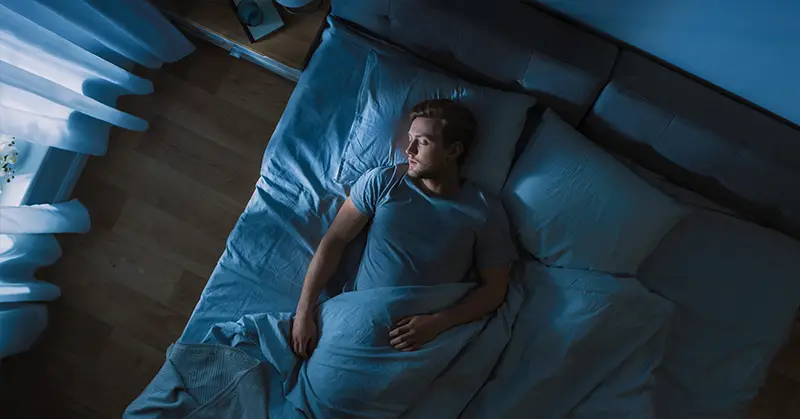Have you ever been on the verge of drifting off to sleep when suddenly, your body jerks, jolting you awake? This unexpected sensation can be unsettling, often accompanied by the sensation of falling. It’s known as a hypnic jerk, and while it can be surprising, it’s a fairly common occurrence. In fact, studies suggest that 60% to 70% of people have experienced this phenomenon. But what exactly causes these sudden jerks, and what’s happening in your body during that moment? Let’s dive into the science behind hypnic jerks and the stages of sleep.
Understanding the Stages of Sleep

To grasp why hypnic jerks occur, we need to understand the sleep process. Sleep isn’t a simple “on-off” switch; rather, it’s a cycle of different stages, each playing a crucial role in rest and rejuvenation.
Stage One: Light Sleep Begins
This is the initial phase of sleep, lasting only a few minutes. It’s a transitional stage, where your body starts to slow down:
- Heartbeat and breathing become more regular.
- Eye movements slow, and your muscles begin to relax.
- Brainwaves start to decelerate from their alert patterns, signaling the start of sleep.
This stage is often where hypnic jerks occur, as the body adjusts from wakefulness to sleep.
Stage Two: Deeper Light Sleep
The second stage is where light sleep deepens, setting the stage for more restorative phases:
- Heart rate and breathing slow further.
- Body temperature drops, preparing the body for deeper sleep.
- Brain activity slows, but with brief bursts of electrical activity called sleep spindles.
This phase usually lasts longer than stage one and serves as a bridge toward deeper sleep.
Stage Three: Deep Sleep
This is the phase that provides the most restorative benefits, essential for waking up refreshed:
- Heartbeat and breathing are at their slowest.
- Muscles are fully relaxed, making it challenging to wake up.
- Brain activity slows significantly, aiding memory consolidation and overall recovery.
Hypnic jerks are less likely to occur in this phase, as the body has settled into a more stable rhythm.
REM Sleep: Dreaming and Brain Activity
About 90 minutes after falling asleep, you enter REM sleep (Rapid Eye Movement):
- Eyes move rapidly under the eyelids.
- Brain activity increases to near-waking levels, causing vivid dreams.
- Breathing becomes irregular, while heart rate and blood pressure rise.
During REM sleep, the body is essentially “paralyzed” to prevent acting out dreams, making jerks highly unlikely at this stage.
What Are Hypnic Jerks?

Hypnic jerks, also known as hypnagogic jerks or sleep starts, are sudden involuntary muscle spasms that occur during the transition from wakefulness to sleep. These jerks can range from mild twitches to full-body jolts and are often accompanied by a falling sensation. This phenomenon is a normal part of the sleep-wake process and is not harmful, although it can be startling.
Why Do Hypnic Jerks Happen?
The precise cause of hypnic jerks isn’t fully understood, but there are several theories as to why they occur:
1. Nervous System Misfire
The body’s nervous system may sometimes send mixed signals during the transition to sleep, leading to a sudden muscle contraction. As the brain begins to enter a more relaxed state, it may inadvertently trigger motor neurons, causing a hypnic jerk.
2. Evolutionary Defense Mechanism

Some researchers believe that hypnic jerks could be linked to an evolutionary reflex. As early humans dozed off in trees or other high locations, this reflex might have served as a protective mechanism to prevent falling by waking them up before a potential fall.
3. Fatigue and Sleep Deprivation
Hypnic jerks are more likely to occur when you’re sleep-deprived or overly tired. When the body is under stress from lack of sleep, the brain may try to rush through the sleep stages, leading to an abrupt transition from stage one to REM sleep. This rapid shift can result in hypnic jerks.
Are Hypnic Jerks Dangerous?
The good news is that hypnic jerks are harmless. Although they can be surprising, they don’t indicate any underlying medical problem. They’re simply a natural part of the body’s transition from being awake to asleep.
How to Calm Your Mind After a Hypnic Jerk

If you find yourself feeling anxious or unable to fall back asleep after experiencing a hypnic jerk, try to:
- Stay calm: Remind yourself that this is a normal occurrence and not a sign of a problem.
- Take slow, deep breaths: Focused breathing can help calm the mind and ease you back into sleep.
- Maintain a consistent sleep schedule: Going to bed and waking up at the same time daily can reduce the likelihood of experiencing hypnic jerks.
The Link Between Hypnic Jerks and Sleep Deprivation
Sleep deprivation is one of the most common triggers for hypnic jerks. When you’re sleep-deprived, your body is more prone to experiencing jerks as it struggles to adjust from wakefulness to sleep.
Tips to Reduce Hypnic Jerks Caused by Lack of Sleep
If hypnic jerks are happening frequently due to lack of sleep, consider the following strategies:

- Prioritize 7-9 hours of sleep: Ensuring you get adequate sleep can minimize the frequency of hypnic jerks.
- Create a relaxing bedtime routine: Winding down with calming activities like reading or gentle stretching can help you transition smoothly to sleep.
- Avoid stimulants: Caffeine and other stimulants can make hypnic jerks more likely by increasing alertness and delaying sleep onset.
What to Do if Hypnic Jerks Occur During the Day
While hypnic jerks usually occur at night, they can sometimes happen when you’re overly tired during the day—like during a lecture or a long meeting.
How to Stay Alert and Avoid Hypnic Jerks in Daytime Settings
If you find yourself dozing off in a situation where you need to stay awake:
- Focus your attention: Concentrate on an important detail in the room or make eye contact with the speaker.
- Drink caffeine strategically: A cup of coffee before a long meeting or lecture can help keep you awake.
- Adjust your environment: If possible, sit in a bright, well-ventilated area to stay alert.

Conclusion: Understanding the Body’s Natural Sleep Reflexes
Hypnic jerks may be surprising, but they’re a natural part of the sleep process. They occur as your body transitions from wakefulness to sleep, especially when you’re tired or sleep-deprived. While they can be alarming, they’re not dangerous. Understanding why hypnic jerks happen can help you manage them better and ensure a more restful sleep. So, the next time you experience one, remember that it’s just your body’s way of signaling it’s time to rest.


